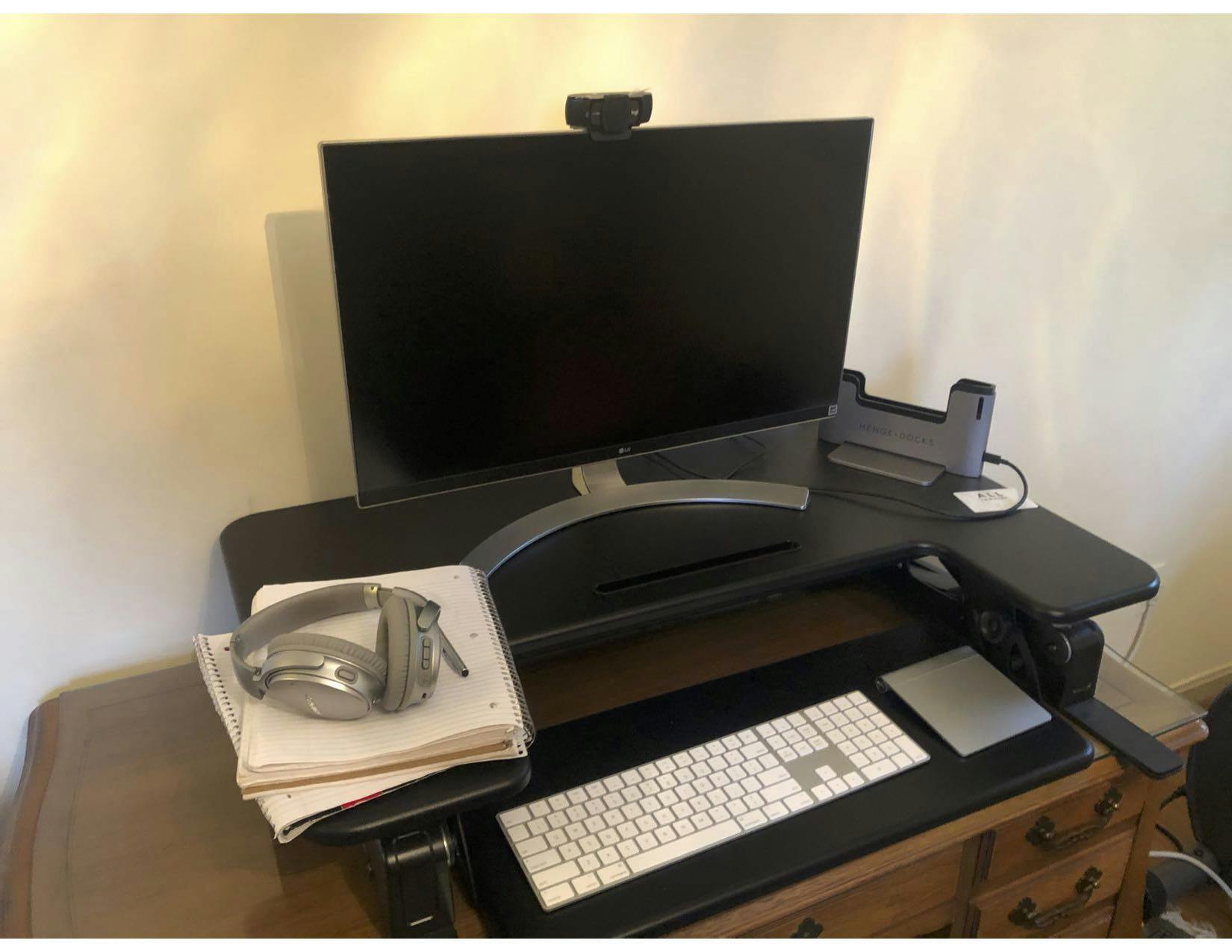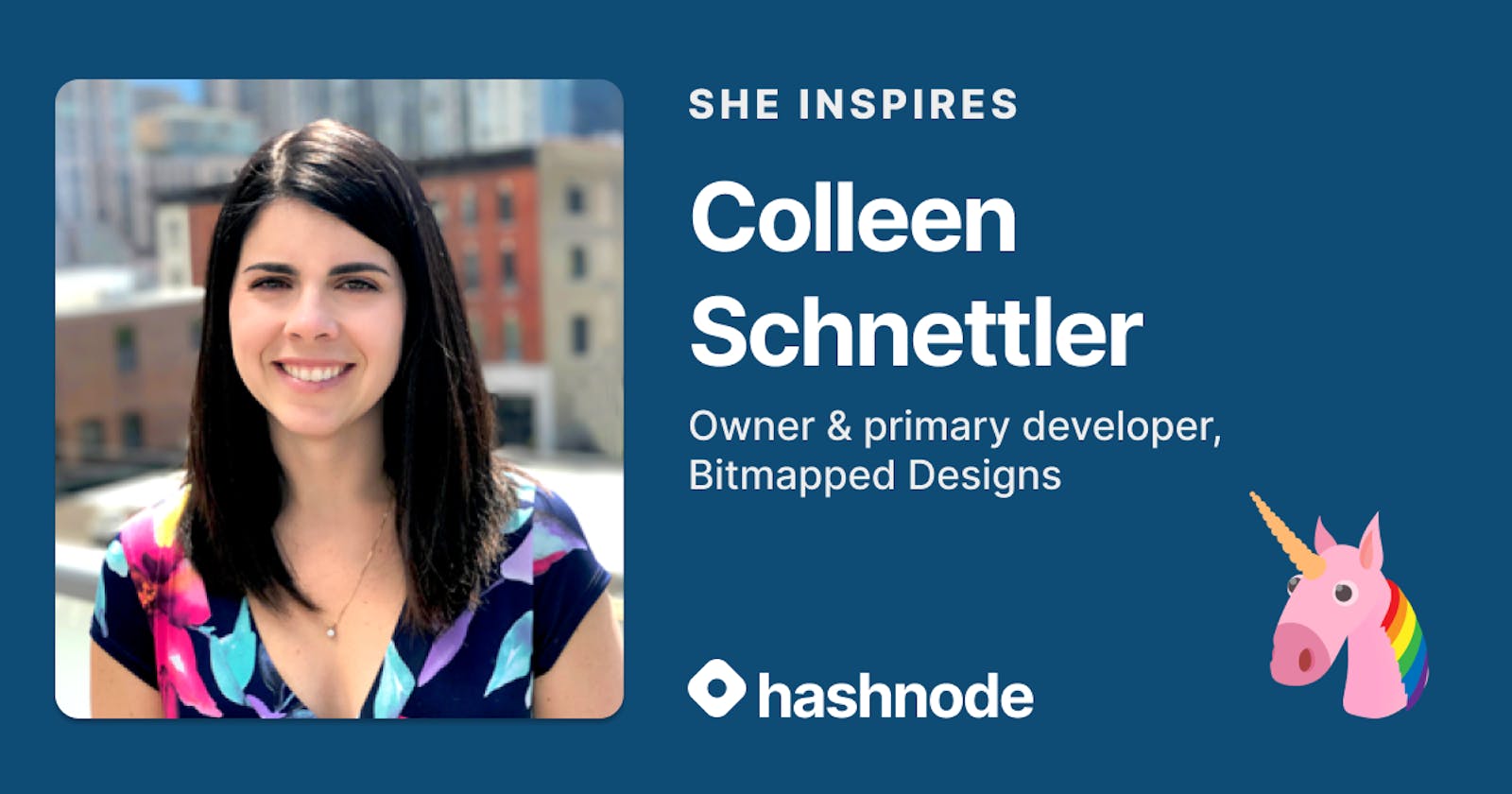Today, we have Colleen Schnettler 👩💻, the owner and primary developer at Bitmapped Designs, a full-service software consulting company. Prior to starting her business, she worked as a hardware and software systems integration engineer in the shipbuilding industry.
Contribute to open source. It's impossible to understand the scope of modern-day software working alone on pet projects. Pet projects are good, but not sufficient to get you a job! Open source will teach you how to work in a large repo with a distributed team of engineers. This will put you in a much better position to get a job.
— Colleen Schnettler
In this interview, you'll to learn how Colleen started her career in tech, her journey so far, advice on tech, consultation and open source. If this interview was helpful to you, please share it with your friends and colleagues and help others 🚀💜

Please tell us a little bit about yourself. How and when did you venture into tech?
Colleen: I always had an interest in math and science and a desire to build things. I studied electrical engineering in college and worked in hardware design at Motorola after graduating. Several years (and children) later, I decided to transition to web development because it provides a more family-friendly work environment.
Can you briefly tell us about your job title?
Colleen: Yes! I run a single person consultancy. This is wonderful because it provides me amazing flexibility - I can work from home on my own schedule. My typical day looks something like this: I wake up at 6 AM with the kids for breakfast and morning routine. I drop the kids off at school at 9 AM and then come home and begin work. My workday starts with a 5-minute meditation and then I jump into "business overhead". This involves responding to client emails, tracking and sending invoices, and scheduling meetings. I don't enjoy the overhead part of running a business, so I try to get it out of the way first! I then do several deep work sessions for clients. It takes a while to grow a consultancy, so I'd recommend if you're new to tech to start with a more traditional job. This will help you grow quickly and learn how large software projects are organized.
What difficulties have you faced on your way in tech? Have you ever felt like you were not treated as equal?
Colleen: This question literally made me laugh out loud. Yes. All. The. Time. I've been in tech for 15 years now, and truthfully it's exhausting. I try not to share too much of my negative experiences with younger women, as I don't want to scare them or make them reconsider their decision. I've dealt with a lot of crap being a woman in tech, and honestly, it hasn't gotten better.
If there is a bias women face, why do you think it is still there, in the 21st century? What are some things people and organizations could do to change this?
Colleen: We need more women in the industry. Fundamentally I think the problem is that because there are so few women our work is constantly under a microscope. If a male engineer has only worked with two women in his life (entirely plausible) and his experience with the first one was poor, he's going to extrapolate that to all women. It's our natural inclination as humans. Also, programs to "hire more women" have backfired because there is a perception that unqualified women were hired because of their gender.
You currently work as a Ruby on Rails Consultant, how long did it take you to arrive here, and what significant difficulties did you face along the way?
Colleen: I had an enormous advantage because I have a technical degree. I would encourage all women to get college degrees if feasible. 99% of the time the people saying "you don't need a college degree" are white men. They don't need degrees because they are assumed competent. We are not. Building my consultancy actually had nothing to do with my degree, but my degree gave me credibility. It took me about 4 years from starting to learn Rails to feeling comfortable in my client load. I started very part-time, studying nights and weekends around my day job. I also have 3 children, so balancing family, work, and studying was an enormous challenge. I was tired a LOT. After tinkering and taking online courses for a while I spent a year doing a big push, working every night, contributing to open source, and attending meetups before work started coming my way.
We see that you work predominately in Consultation and Ruby on Rails. How did you decide to focus on these paths?
Colleen: I chose this path because it allows me an incredible amount of flexibility.
What advice do you have for a newbie or intermediate who dreams of working as a Consultant?
Colleen: Contribute to open source. It's impossible to understand the scope of modern-day software working alone on pet projects. Pet projects are good, but not sufficient to get you a job! Open source will teach you how to work in a large repo with a distributed team of engineers. This will put you in a much better position to get a job.
How long have you been in tech, and what word will describe your experience so far?
Colleen: Fifteen years. Generally good! Tech has allowed me to create a work environment that fits into my lifestyle, stay technically-challenged, and understand forces that are shaping modern-day life.
You founded Bitmapped Designs. What inspired this?
Colleen: Flexibility and freedom.
You are a "writing machine" Colleen, what's your super power?
Colleen: I don't think I'm a "writing machine". I've written a few blog posts. I typically do this to remind myself of how to do something!
What advice do you have for beginners or intermediates who look forward to technical writing?
Colleen: Just write. It helps to walk through the technical process as you're writing (especially if you include code snippets).
What do you think needs to be done to encourage beginner developers to learn programming languages and continue learning?
Colleen: I would love to see more job opportunities for junior developers.
Imposter syndrome is one problem developers face especially newbies, what is your experience with imposter syndrome, how did you manage yours, and what advice do you have for anyone facing this currently?
Colleen: I think this term is used incorrectly. You can only have imposter syndrome if you're skilled in a specific area. So when you're a newbie this term doesn't apply, because you aren't yet an expert. To fight the general feeling of inadequacy newbies face I'd suggest coding a lot and asking tons of questions. Women are socialized to be perfect. We are terrified of making mistakes. I used to review my own PRs several times before submitting them. Men don't do that. They do their work, submit it, and if they get negative feedback they deal with it and move on. Their feedback loop is tighter, so they (potentially) advance faster. We need to be brave, accept criticism, and move on without feeling like our self worth has been challenged.
Rejection emails are another thing that motivates imposter syndrome and depression amongst developers, especially intermediates. How did you manage this effectively during your "job-hunting" days?
Colleen: I've been there, and it can be incredibly frustrating. Don't take it personally, it's a numbers game. Eventually, your skills will align with a great company. Job hunting is an exercise in persistence.
What advice would you give to aspiring programmers who look forward to working for companies like Microsoft or Apolitical?
Colleen: Get a college degree. Study with purpose.
Which of your projects are you most proud of? Can you briefly introduce us to it and why you built it?
Colleen: Unfortunately, most of my projects are for private companies, so I can't share them. I am working on an image processing solution in the cloud right now that I'm excited about, but it's not complete!
What is the best advice someone has given you that has helped you in your career?
Get involved in open source.
What are your favorite programming tools?
Colleen: I'm dependent on Sublime, Github, and Slack for coding. To run my business I use Quickbooks and Harvest.
What does your development environment look like?

I have a henge dock for my MacBook, an external 4K 27" monitor, an HD camera for video conferencing, and a desk that transitions from sitting to standing.
Finally, what would be your message to women trying to get into technology?
Colleen: It's an exercise in patience and persistence. Don't give up! Find a community of other women for support on your journey.
Thanks for taking out time to read this interview. 👋
This series is all about talking to the awesome women in tech, understanding the current health of the tech industry and inspiring other women to become better. If you want to share your story, please reach out to me on Hashnode.
Did you find Colleen's story useful and inspiring? Write down your thoughts in the comments section below and don't forget to share this interview. You can also follow Hashnode on Twitter to stay up-to-date with our future She Inspires interviews.
See you next time and keep trailblazing 💪💙

